14th MARCH - Letter to the Editor, North Eastern Daily Gazette:-
MIDDLESBROUGH DETACHMENT, 4TH BATTALION YORKS REGIMENT.
Sir,
I wish to point out, through the columns of your widely read paper, that the above detachment, which I have the honour to command, is in need of a few recruits of good physique.
I would like recruits to come forward at once in that they may be efficient for the Annual Training, which probably takes place at the end of July at Conway, North Wales.
Each fully efficient man who does his annual 15 days training in camp is entitled to a bounty of �1, in addition to his pay and separation allowance.
Full particulars can be obtained from Colour Sgt Instructor Webb, 4th Yorks Drill Hall, Abingdon Rd, Middlesbrough.
I am yours faithfully,
G H Bowes-Wilson. [Capt].
|
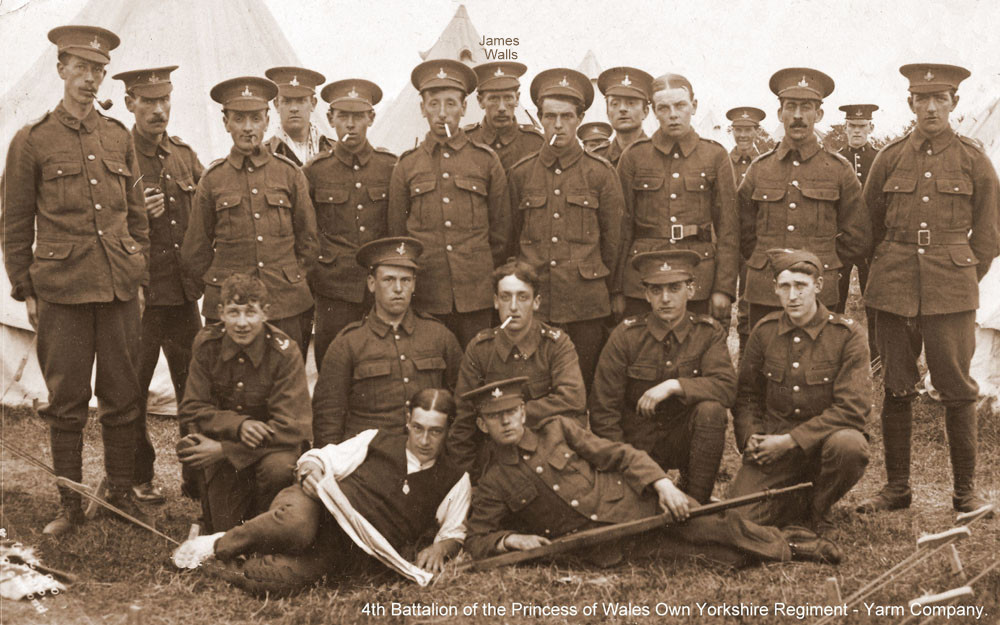
Yarm Company C at Camp.
Only man identified, James Walls, back row shown.
Photograph kindly contributed by Great Grandson of James Walls, Martin Jones, native of Yarm and now living at Ferrensby, nr Boroughbridge, N Yorks.
|
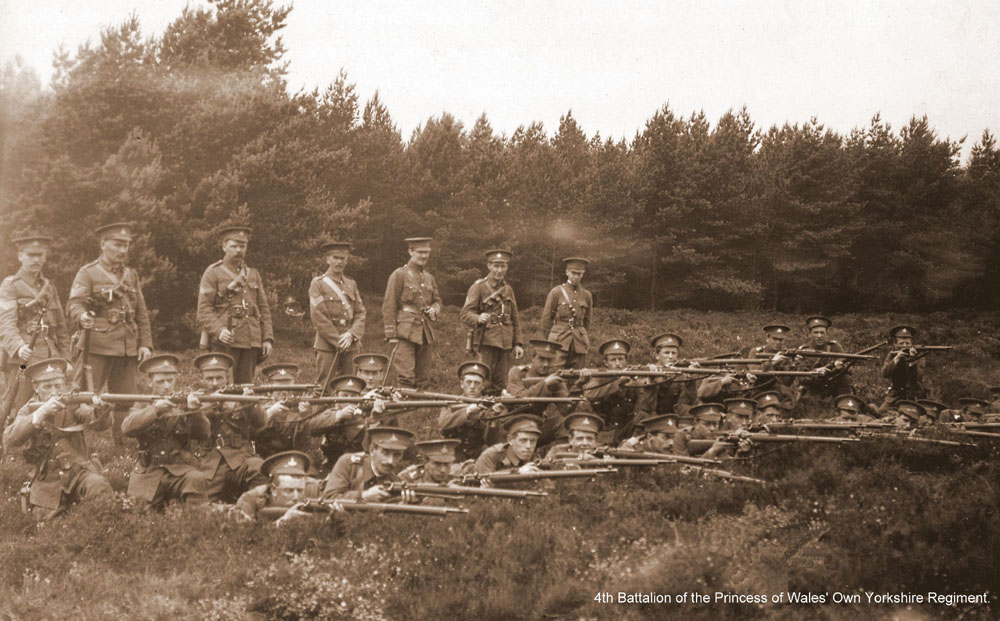
4th Battalion men on the Range.
No one identified.
Photograph kindly contributed by Great Grandson of James Walls, Martin Jones, native of Yarm and now living at Ferrensby, nr Boroughbridge, N Yorks.
|
28 JUNE. Archduke
Ferdinand, heir to the Austrian throne was shot in Sarajevo, starting the First World War.
The killing of the Archduke was only the spark that ignited a powder keg of World problems.
Nationalism and Imperialism were rampant.
The French and Germans had old grievances to settle.
Small nations wanted independence.
The Germans, powerful, but enclosed and desiring expansion were jealous of British sea power and the British and French
colonies and had come close to War in the recent past.
The Germans, Austrians, Russians and others were ruled by autocratic powers, detached from the terrible reality of what
could destroy themselves and many of their peoples, for whom they often cared little.
Diplomacy was an intrigue conducted by similar aristocrats and no system of communication existed to draw back from
a devastation that could have been avoided and was to change the World forever.
European wars in the past had been settled in pitched battles using short range cannon, cavalry charges, rifles and
bayonets.
At first it seemed it would be that way again.
|
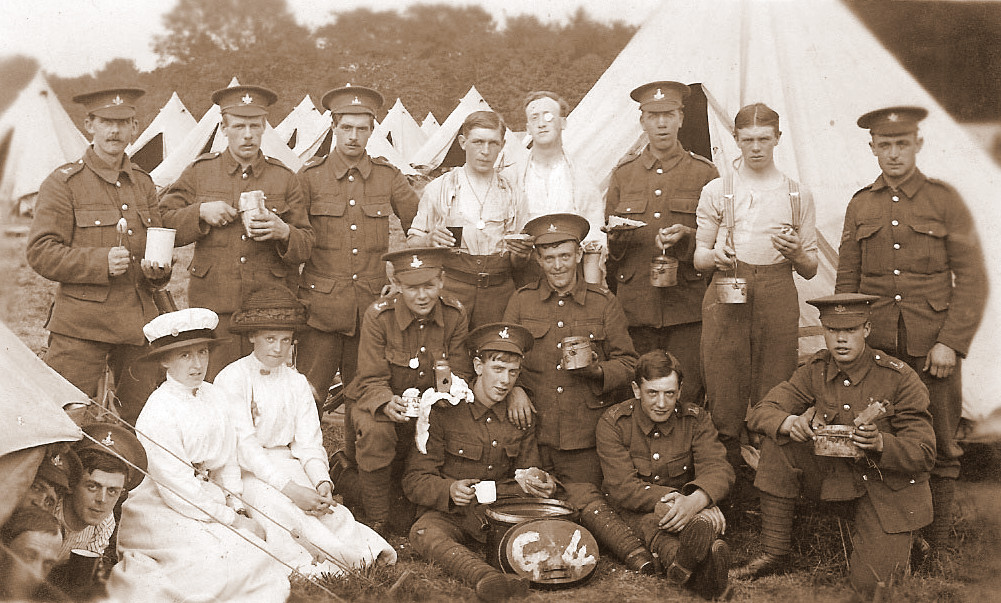 "G", Skelton detachment of the 1/4th Battalion. Probably at their Annual Camp, Redcar, N Yorks, July/August 1913 .
"G", Skelton detachment of the 1/4th Battalion. Probably at their Annual Camp, Redcar, N Yorks, July/August 1913 .
[Photograph kindly donated by Peter Appleton of Skelton, N Yorks. His Grandad, Fred. is the third face from the bottom looking out of the tent.]
|
 Back row, second from Left, Amos Marley. Far right, Fred Appleton.
Back row, second from Left, Amos Marley. Far right, Fred Appleton.
Middle row, far right, Charles Preston. Middle row, second from right, Herbert Cook [my Grandad].
Herbert was awarded the Military Medal in 1916. In Jan 1917 he was hit by a shell and died of wounds near Albert, Somme.
[Photo owned by website.]
|
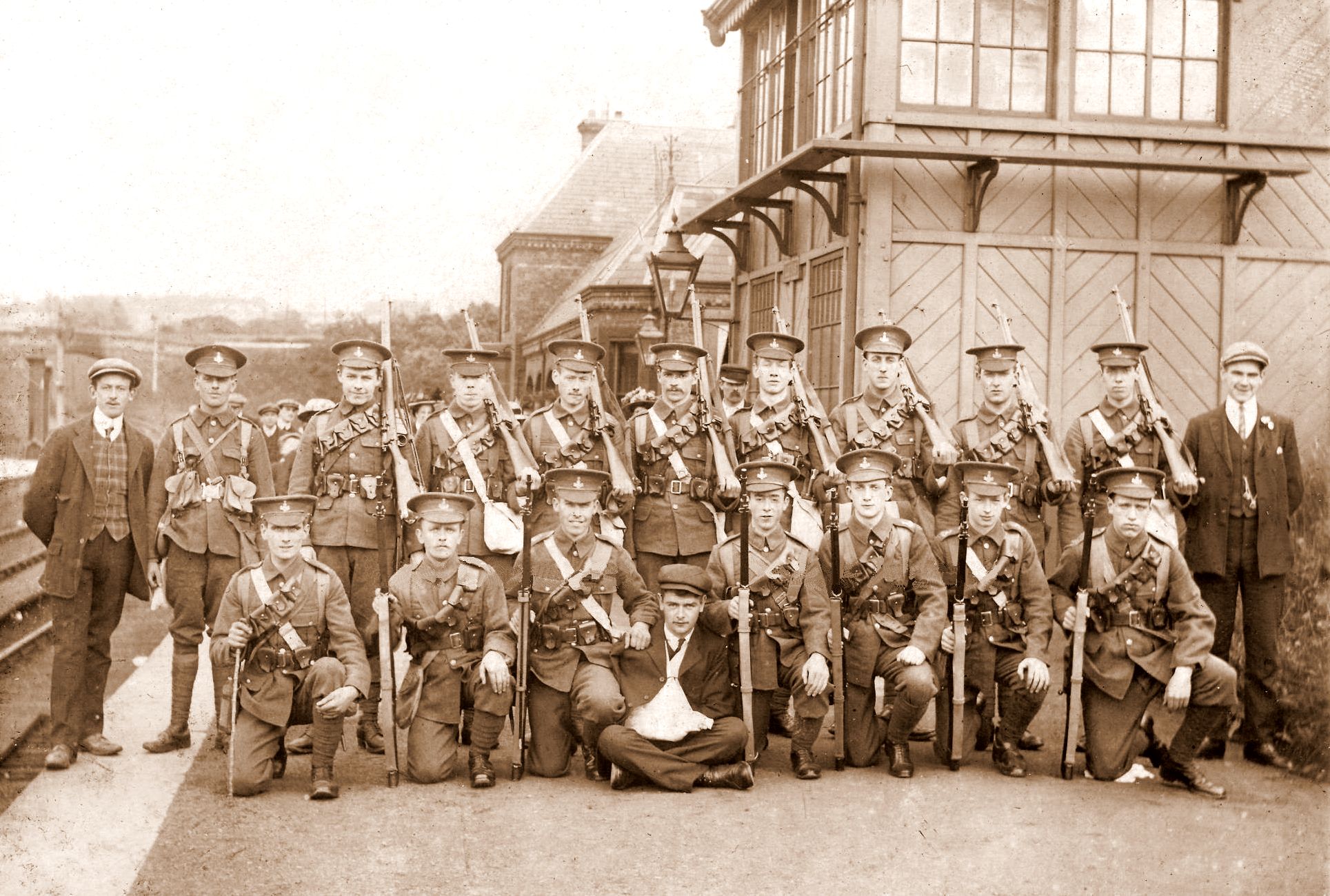 The Loftus detachment of G Company.
The Loftus detachment of G Company.
Almost certainly waiting for the train to take them to Annual Camp. Possibly the last one in July 1914 at Deganwy, Wales.
Photograph kindly contributed by John Hannah of the East Cleveland Image site, via Andrew Barwick.
|
JULY - The local 4th Battalion of the Yorkshire Regiment were part of the "Northumbrian", Division
and were at Deganwy Camp in Wales for the annual Divisional Training.
The last few days were full of rumours of pending War and when the Camp broke up on the 3rd of August, each Company proceeded to its own Headquarters.
The last two days of the first week of annual training were full of alarms and excursions, and then we upped sticks, leaving all our company stationery boxes with our mobilisation papers in them, and each company proceeded
to its headquarters. Two days later came the orders to mobilise,
reported Lt Col M L Bell, 4th Battalion.
1 AUGUST. Germany declared War on Russia and the next day on her ally France.
4 AUGUST. Germany, circumventing the well prepared French forts in Alsace and Lorraine, invaded Britain's ally Belgium.
Britain, therefore, declared war on Germany.
5 AUGUST - The 4th Battalion, received the order to mobilise.
When each Company had assembled, at Northallerton, it was found that only eleven of the whole Battalion were absent or unaccounted for.
Of these, one was dead and three were at sea. Of the seven absentees nothing is known.
|
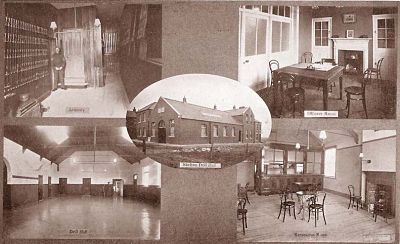 The Drill Hall Skelton, N Yorks. Picture taken at later date.
The Drill Hall Skelton, N Yorks. Picture taken at later date.
[Photograph kindly contributed by Graeme Fisher of Drill Halls website.]
|
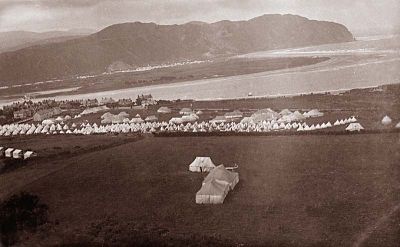 The York and Durham Brigade Camp at Deganwy, North Wales.
The York and Durham Brigade Camp at Deganwy, North Wales.
The Annual Camp in August 1914.
|
The Regimental History states that after 5 days at Northallerton they moved for a week to Newcastle and finally joined a Brigade camp at Hummersknott Park, Darlington.
A report says men were sent to their home defence locations - coastal areas to watch for invasion, dockyards and other areas of national importance and probably this was a combination of things.
The Germans did, in fact, shell Scarborough and the North East coast from the sea causing long states of "high alert".
At Skelton in Cleveland, the local "G" Company, some 160 men, paraded at their new Drill Hall and performed a ritual that
was repeated many times throughout the North Riding of Yorkshire and the whole nation.
The Rev. C.F. Littleton, not having to go himself, addressed the men in a few words, urging them:-
�Be Sober, Be Vidulent, Quit you like men�.
He also went on to say that when the time came for them to go to the front, they would:-
"Be as Englishmen always have been and would fight for the Honour of King and Country."
|
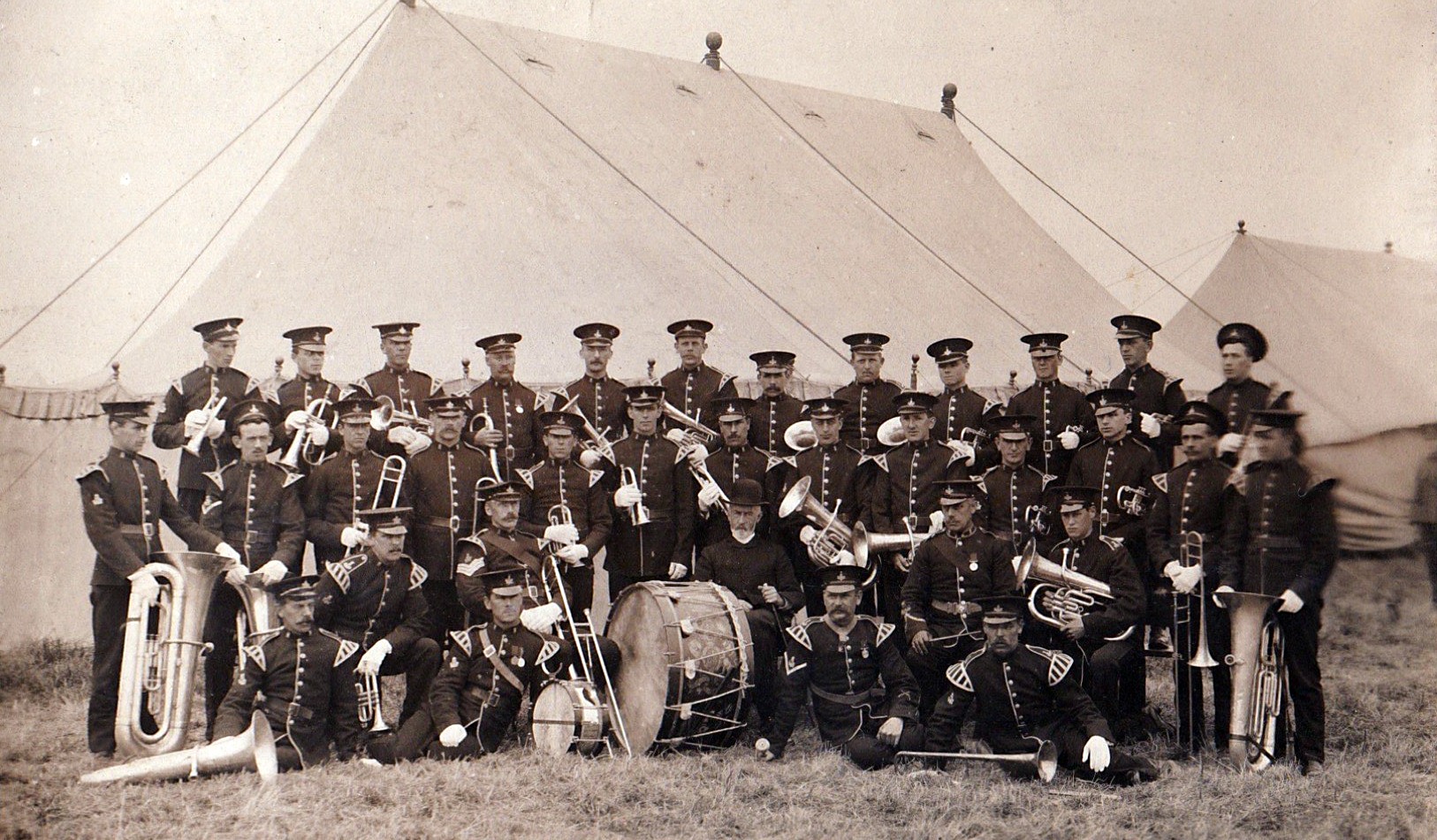
The 4th Yorks Band at Darlington, September 1914.
Only person identified is Fred Appleton, second from Left in the back Row.
[Photograph kindly contributed by Chris Holmes of Surrey.]
|
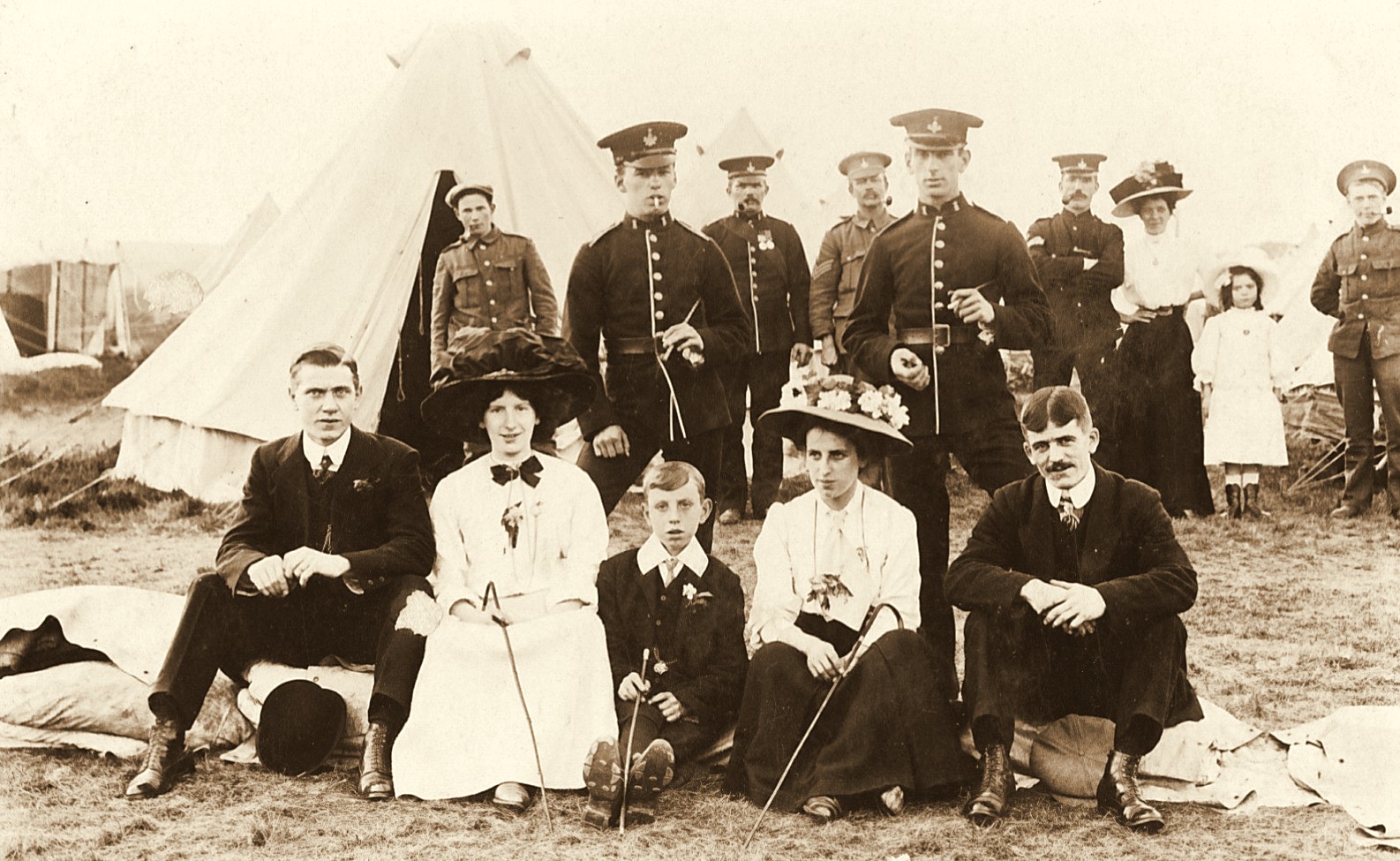
Darlington, September 1914. No one identified.
[Photograph kindly contributed by Chris Holmes of Surrey.]
|
|



